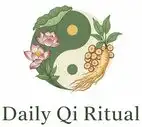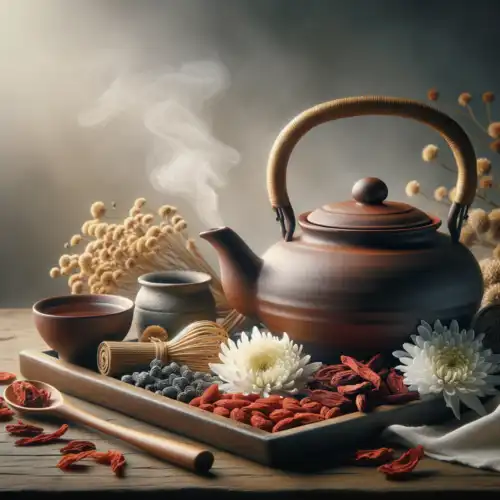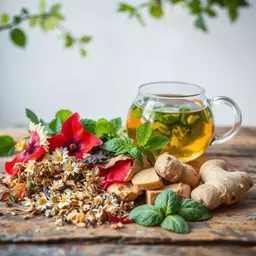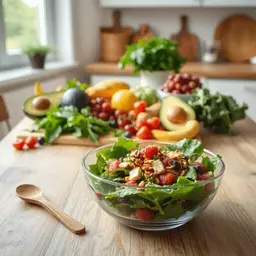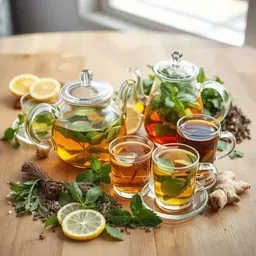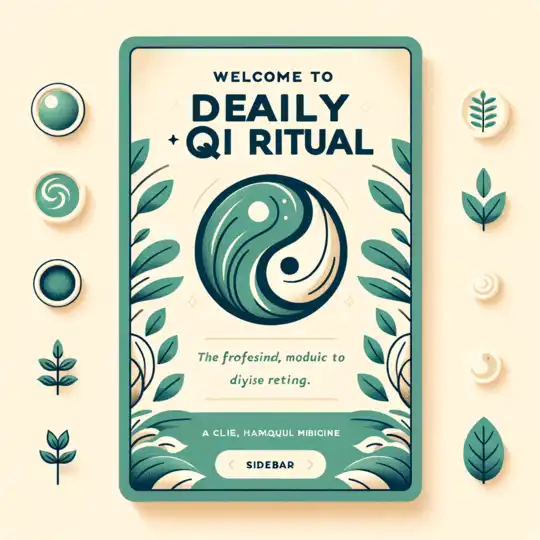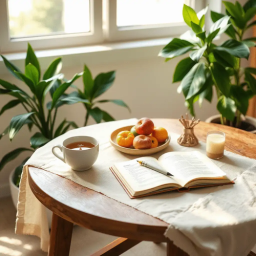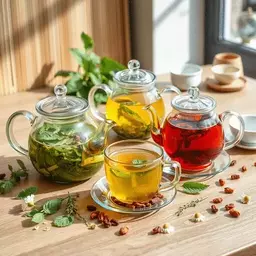Throughout centuries, the ritual of brewing and enjoying tea has transcended mere consumption, becoming an emblem of respect, health, and community. Did you know that tea is not just a beverage in China but a vital thread weaving together traditions and social bonds? Let's delve into the essence of Traditional Chinese Herbal Teas and uncover the wisdom they hold.
What You Will Learn
- Cultural Importance: Tea serves as a symbol of respect and is integral to social interactions in Chinese culture.
- Historical Roots: The practice of brewing herbal teas is steeped in thousands of years of history, connected to Traditional Chinese Medicine (TCM) and healing.
- Health Benefits: Each herb used in teas, like ginger and chrysanthemum, is selected for its specific health benefits, promoting overall well-being.
- Myth Busting: Understanding common misconceptions about herbal teas, such as their caffeine content and brewing methods, can enhance your tea experience.
- Brewing Techniques: Learning the right amount of tea to use and how to steep it properly will elevate your enjoyment and flavor outcomes.
- Storage Tips: Proper storage is crucial for maintaining the quality and flavor of your herbal teas, ensuring a delightful brew every time.
Common Myths About Brewing Herbal Teas
Explore the prevalent myths surrounding the brewing of Traditional Chinese Herbal Teas.
Myth 1
All herbal teas are caffeine-free.
Myth 2
You should always boil water for tea.
Myth 3
Herbal tea brewing is time-consuming.
Myth 4
Only loose-leaf teas provide good flavor.
Understanding the Cultural Significance of Traditional Chinese Herbal Teas
Herbal teas hold a deeply rooted place in Chinese culture, serving not just as beverages but as a symbol of connection to tradition and community. At Daily Qi Ritual, we celebrate these age-old practices, exploring how they enrich our lives. Have you ever felt a warm cup of tea bring you comfort? This simple act transcends generations and offers a glimpse into a culture that values harmony and health.
The Role of Tea in Chinese Culture
Tea is more than a drink in China; it's a fundamental aspect of daily life and social interaction. Traditionally, tea is served as a gesture of hospitality, where families and friends gather to share stories. This ritual fosters connections, both within families and among friends, making tea an integral part of social cohesion.
- Symbol of Respect: Presenting tea to guests signifies respect and appreciation.
- Family Traditions: Many families have their unique tea rituals passed down through generations.
- Cultural Celebrations: Tea plays a vital role in festivals and ceremonies, enhancing the spirit of togetherness.
Moreover, tea traditions vary by region, with each area showcasing its unique flavor profiles and brewing techniques. The diversity in teas, from delicate green teas to rich black teas, reflects the rich tapestry of Chinese culture.
Historical Context of Herbal Tea Brewing
The history of herbal tea brewing in China dates back thousands of years, intertwining with traditional medicine and cultural practices. Ancient texts reveal that herbal teas were initially used for their medicinal properties, aiming to restore balance and health. Have you ever wondered why certain herbs are used in teas? It’s all about understanding their unique benefits!
- Ancient Practices: Early Chinese dynasties utilized herbs for healing and wellness.
- Integration with TCM: Herbal teas became integral to Traditional Chinese Medicine (TCM), promoting holistic health.
- Cultural Evolution: Over the centuries, these practices evolved, leading to a rich heritage of tea brewing.
At Daily Qi Ritual, we honor this historical journey by reintroducing these ancient practices into modern living, emphasizing the benefits of herbal teas in our daily routines.
Traditional Chinese Medicine (TCM) and Herbal Teas
In TCM, herbal teas are crafted to balance the body’s Qi, or vital energy. Each ingredient is chosen for its unique properties, aimed at supporting physical, emotional, and spiritual well-being. Have you explored how different herbs can benefit your health? It’s truly fascinating!
- Ginger: Often used for digestion and warming the body.
- Chrysanthemum: Known for its calming properties and benefits for eye health.
- Goji Berries: Packed with antioxidants, they’re believed to boost vitality.
By incorporating these herbal teas into your routine, you can tap into the wisdom of TCM and enhance your overall well-being. Let’s embrace this ancient form of healing together, one cup at a time!
Pro Tip
When brewing your herbal teas, experiment with different steeping times and temperatures to discover the flavor profiles that resonate with you. For example, lighter teas like chrysanthemum may only need 3-5 minutes, while heartier ones like ginger can steep longer for a more robust taste. Don’t hesitate to adjust these variables, as the perfect cup is all about personal preference!
Common Questions and Answers about Brewing Traditional Chinese Herbal Teas
When it comes to brewing Traditional Chinese Herbal Teas, many people have questions. I often hear common myths and misconceptions that can make the process seem more complicated than it really is. Let’s take a moment to address these misunderstandings, so you can feel confident as you embark on your tea journey.
One prevalent myth is that all herbal teas require boiling water. While some teas, like black tea, do prefer higher temperatures, many herbal teas thrive at lower temperatures. This is just one of the nuanced details that make brewing tea an art form. What if you could brew your tea perfectly just by understanding the right temperature?
Addressing Common Myths and Misconceptions
Here are some of the most common myths I encounter about brewing herbal teas:
- Myth: All herbal teas are caffeine-free.
- Myth: You should always boil water for tea.
- Myth: Herbal tea brewing is time-consuming.
- Myth: Only loose-leaf teas provide good flavor.
Understanding these myths helps pave the way for a more enjoyable tea experience. I encourage you to try brewing with an open mind and see how different practices can enhance your enjoyment of herbal teas!
Frequently Asked Questions from Beginners
If you're new to brewing herbal teas, you might have some burning questions. Here are a few I often receive:
- How much tea should I use? A general rule of thumb is one teaspoon of loose leaf tea per cup of water.
- Can I reuse tea leaves? Yes, many herbal teas can be steeped multiple times, allowing you to enjoy different flavor profiles!
- What if I want to sweeten my tea? Natural sweeteners like honey or rock sugar can complement the flavors beautifully.
- How do I know when my tea is ready? Pay attention to color and aroma; these are great indicators that your tea has infused properly.
As you gain experience, you'll discover what works best for your taste preferences. Remember, practice makes perfect!
Tea Storage Tips for Maintaining Quality and Flavor
To keep your herbal teas fresh and flavorful, proper storage is key. Here are some helpful tips:
- Store in a cool, dry place away from direct sunlight.
- Use airtight containers to prevent moisture and odor absorption.
- Label your containers with the date you opened them to keep track of freshness.
- Avoid storing tea in the fridge unless you’re keeping it for an extended period, as moisture can affect quality.
By following these storage tips, you can ensure that each cup of tea retains its delightful essence. It’s a small step that makes a big difference in your tea ritual!
If you are interested in other holistic health topics, you might like to read about understanding acupuncture.
Conclusion: Embracing the Art of Brewing Chinese Herbal Teas
In summary, brewing Traditional Chinese Herbal Teas is both an art and a science. By understanding the cultural significance, addressing common myths, and asking the right questions, you’re already on the path to becoming a confident tea brewer. Remember, each cup of tea is not just a drink; it’s a part of a ritual that connects you to centuries of wisdom.
So, I invite you to explore and enjoy these traditional tea rituals. Whether you're sipping a calming jasmine tea or a robust pu-erh, embrace the experience and allow it to nourish your Qi. Let’s celebrate these moments of harmony together at Daily Qi Ritual!
If you're looking to enhance your daily routine, explore the benefits of incorporating mindfulness in everyday life, which can complement your tea ritual.
Recap of Key Points
Here is a quick recap of the important points discussed in the article:
- Cultural Importance: Herbal teas are a symbol of connection, hospitality, and tradition in Chinese culture.
- Historical Significance: The brewing of herbal teas is rooted in ancient practices and is intertwined with Traditional Chinese Medicine (TCM).
- Health Benefits: Different herbs used in teas, such as ginger and chrysanthemum, provide various health benefits and support overall well-being.
- Myth-Busting: Common myths about herbal tea brewing, such as the need for boiling water and the assumption that all herbal teas are caffeine-free, can hinder your tea experience.
- Storage Tips: Proper storage of herbal teas is essential for maintaining their quality and flavor; use airtight containers and keep them in a cool, dry place.
